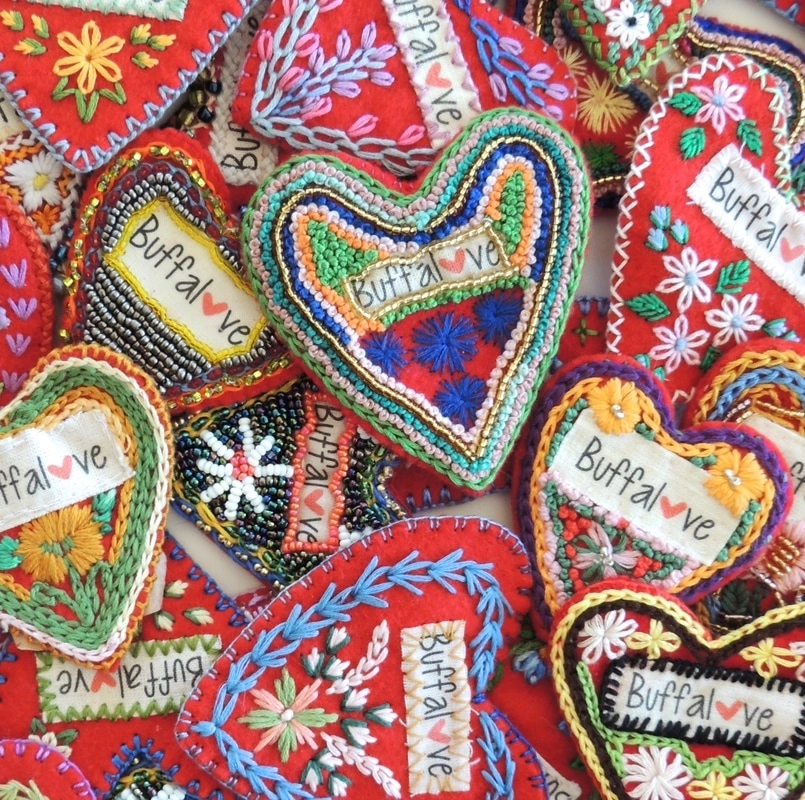Buffalo’s West Side is a very diverse area. Despite the stark contrasts in ethnicities, religious preferences and languages spoken, Dawne Hoeg, Director of Stitch Buffalo, also saw a unique similarity.
“I was aware of the women walking down the streets and waiting at the bus stops with their children and I thought ‘Wow, I have something in common with these women when it comes to textile,’” explained Dawne.
Hoeg, a lecturer with the Textile and Fiber Arts Design Department at Buffalo State College, found herself wondering more about a common thread between her and the refugee women that lived in her neighborhood. She set out to find a way to connect with them about a shared interest.
“I started a small program to bring community members together, share what we know, and be creative together,” she stated.
Dawne went door-to-door at local church groups and refugee resettlement agencies with a set of handmade information cards and asked to see if any of the women were interested in joining a group dedicated to learning about international textile arts. And very simply, Stitch Buffalo was born.
Stitch Buffalo is now a 501(c)(3) organization and serves the community by creating cross-cultural experiences and opportunities for economic empowerment for resettled refugee women. Every week, women attend free workshops to sew handcrafted goods that they later place for sale in the community. Through the creation of these beautiful textiles, the women have the opportunity to nurture their cultural heritage while taking initial steps toward financial independence.
The nonprofit has since blossomed into a thriving community of over 55 women from Bhutan, Burma, Nepal, Thailand and Angola.
“At the beginning, it was about building a community,” reflected Dawne. “Our classes are beaming with women around the table and they’re just here to be creative…that’s why this is such a beautiful project.”
The foundation of the programs offered at Stitch Buffalo has always centered on relationship building and knowledge sharing, but it wasn’t long before another crucial skill came out of the workshops: financial empowerment.
“We’re a great transition point for women to come out of the home,” explained Dawne. “These women can come and practice their English and practice their skills and then find a full-time job. That’s true for some of them, and then some are fine just coming here to be a part of the community and are excited to earn a little extra money on the side.” Either way, the opportunity for the participants to make money from selling their handmade goods is an unexpected perk for many of whom hadn’t had this opportunity before joining.
Empowering members of Buffalo’s West Side has long been a key piece in Rich’s philanthropic efforts, so the decision to partner with Stitch Buffalo was an easy one. “Stitch does a fabulous job at giving these women an opportunity to learn a trade and make money to take care of their families,” said Howard Rich, Vice President of Corporate Relations at Rich’s.
Howard initially learned about Stitch Buffalo through “Vision Niagara” an organization dedicated to revitalizing the Niagara Street Corridor. After learning about the company’s mission, Howard was eager to find a way to accommodate their needs. “We came to Rich’s because we were looking for a place in the West Side where we could have a retail shop and a workspace all in one, without huge overhead,” explained Dawne.
Looking for a home for the burgeoning Stitch community, an old butcher’s shop that Rich’s owned for many years seemed to be the perfect fit. After a year of renovations, working with the city on zoning, and bringing the building up to electrical code, the structure was ready to welcome new occupants.
Rich’s rents the 1215 Niagara St. building to Stitch Buffalo for $10 a year. The reimagined area has given the women access to a larger work area in the rear of the building, as well as a charming storefront to display and sell their finished products. The room is covered with hand-sewn patterned elephants, intricately embroidered tote bags, hand-woven bracelets and the hugely popular “Buffalove” heart pins.
“Stitch really embodies the vibrant diversity on Niagara St. and I just think it’s fabulous that these artisans from around the neighborhood can walk or hop on public transit to get here, build community and showcase their talents,” Howard said.
Handcrafted textiles from the Stitch Buffalo shop can be purchased every Wednesday from 10:00 a.m. – 3:00 p.m., Saturday from 10:00 a.m. – 4:00 p.m. and Tuesday from 10:00 – 2:00 p.m. Stitch Buffalo also accepts donations during these times, including embroidery floss, glass beads, buttons and thread. To learn more about opportunities to volunteer and support Stitch Buffalo and see their complete wish list, you can visit their website at www.stitchbuffalo.org/


